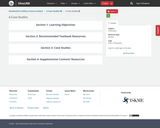
- Subject:
- Philosophy
- Material Type:
- Module
- Date Added:
- 05/16/2019

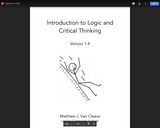
This is an introductory textbook in logic and critical thinking. The goal of the textbook is to provide the reader with a set of tools and skills that will enable them to identify and evaluate arguments. The book is intended for an introductory course that covers both formal and informal logic. As such, it is not a formal logic textbook, but is closer to what one would find marketed as a critical thinking textbook. Downloadable as a pdf file.

The goal of this text is to present philosophy to newcomers as a living discipline with historical roots. While a few early chapters are historically organized, my goal in the historical chapters is to trace a developmental progression of thought that introduces basic philosophical methods and frames issues that remain relevant today. Later chapters are topically organized. These include philosophy of science and philosophy of mind, areas where philosophy has shown dramatic recent progress. This text concludes with four chapters on ethics, broadly construed. I cover traditional theories of right action in the third of these. Students are first invited first to think about what is good for themselves and their relationships in a chapter of love and happiness. Next a few meta-ethical issues are considered; namely, whether they are moral truths and if so what makes them so. The end of the ethics sequence addresses social justice, what it is for one’s community to be good. Our sphere of concern expands progressively through these chapters. Our inquiry recapitulates the course of development into moral maturity
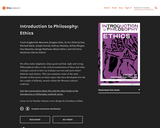
We often make judgments about good and bad, right and wrong. Philosophical ethics is the critical examination of these and other concepts central to how we evaluate our own and each others’ behavior and choices.
This text examines some of the main threads of discussion on these topics that have developed over the last couple of millenia, mostly within the Western cultural tradition. It considers basic questions about moral and ethical judgment: Is there such a thing as something that is really right or really wrong independent of time, place and perspective? What is the relationship between religion and ethics? How can we reconcile self-interest and ethics? Is it ever acceptable to harm one person in order to help others? What do recent discussions in evolutionary biology or have to say about human moral systems? What is the relation between gender and ethics? The authors invite you to participate in their exploration of these and many other questions in philosophical ethics.
If you are adopting or adapting this book for a course, please let us know on our adoption form for the Introduction to Philosophy open textbook series: https://docs.google.com/forms/d/e/1FAIpQLSdwf2E7bRGvWefjhNZ07kgpgnNFxVxxp-iidPE5gfDBQNGBGg/viewform?usp=sf_link.
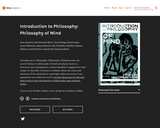
Introduction to Philosophy: Philosophy of Mind (edited by Heather Salazar) surveys the central themes in philosophy of mind and places them in a historical and contemporary context intended to engage first-time readers in the field. It focuses on debates about the status and character of the mind and its seemingly subjective nature in an apparently more objective world.
Written by experts and emerging researchers in their subject areas, each chapter brings clarity to complex material and involves the reader through a wealth of examples. Many chapters include applications of the concepts to film and literature that will stimulate readers to firmly grasp the significance of the philosophy of mind. Subjects covered are how the mind fits into the material world and how to analyze its properties. In that vein, substance dualism, materialism, behaviorism, functionalism, and property dualism are all explored.
In addition, it includes insightful contributions on how to explain seemingly subjective feelings, the mystery of consciousness, conceptual understanding of the world outside of the mind, and free will. The book is designed to be used alone or alongside a reader of historical and contemporary original sources.
If you are adopting or adapting this book for a course, please let us know on our adoption form for the Introduction to Philosophy open textbook series: https://docs.google.com/forms/d/e/1FAIpQLSdwf2E7bRGvWefjhNZ07kgpgnNFxVxxp-iidPE5gfDBQNGBGg/viewform?usp=sf_link.
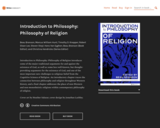
Introduction to Philosophy: Philosophy of Religion introduces some of the major traditional arguments for and against the existence of God, as well as some less well-known, but thought-provoking arguments for the existence of God, and one of the most important new challenges to religious belief from the Cognitive Science of Religion. An introductory chapter traces the connection between philosophy and religion throughout Western history, and a final chapter addresses the place of non-Western and non-monotheistic religions within contemporary philosophy of religion.
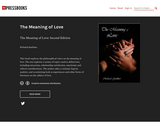
This book explores the philosophical views on the meaning of love. The text explores a variety of topics used to define love, including attraction, relationship satisfaction, emotional, and ethical considerations. The author takes a rational, logical, analytic, and scrutinizing look at experiences and other forms of literature on the subject of love.

Cognitive science arose in the 1950s when it became apparent that a number of disciplines, including psychology, computer science, linguistics, and philosophy, were fragmenting. Perhaps owing to the field’s immediate origins in cybernetics, as well as to the foundational assumption that cognition is information processing, cognitive science initially seemed more unified than psychology. However, as a result of differing interpretations of the foundational assumption and dramatically divergent views of the meaning of the term information processing, three separate schools emerged: classical cognitive science, connectionist cognitive science, and embodied cognitive science.
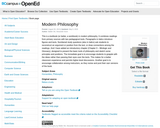
This is a textbook (or better, a workbook) in modern philosophy. It combines readings from primary sources with two pedagogical tools. Paragraphs in italics introduce figures and texts. Numbered study questions (also in italics) ask students to reconstruct an argument or position from the text, or draw connections among the readings. And I have added an introductory chapter (Chapter 0 Minilogic and Glossary), designed to present the basic tools of philosophy and sketch some principles and positions. The immediate goal is to encourage students to grapple with the ideas rather than passing their eyes over the texts. This makes for a better classroom experience and permits higher-level discussions. Another goal is to encourage collaboration among instructors, as they revise and post their own versions of the book.
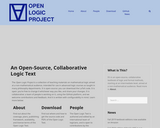
The Open Logic Text is an open textbook on mathematical logic aimed at a non-mathematical audience, intended for advanced logic courses as taught in many philosophy departments. It is open-source: you can download the LaTeX code. It is open: you’re free to change it whichever way you like, and share your changes. It is collaborative: a team of people is working on it, using the GitHub platform, and we welcome contributions and feedback. And it is written with configurability in mind.
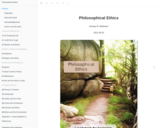
This book is an introduction to philosophical ethics intended for use in introductory college or high school level courses. It has grown out of lecture notes I shared with the first students who took my online Ethics course at the Pennsylvania College of Technology almost 20 years ago. Since then it has seen more development in a variety of forms – starting out as a pdf document, and then evolving into a static set of WordPress pages and finally now as a book written in bookdown and hosted at GitHub. This text represents my attempt to scratch a couple of itches. The first is my wanting a presentation of the major philosophical approaches to ethics that I can actually agree with and that is integrated into my overall teaching method. I tend to teach philosophy to beginners and so there is a fair amount of discussion of the tools used by philosophers and of the ways in which their approach differs from that of their colleagues in other disciplines.
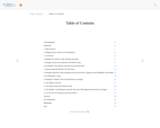
This book is a lucid and accessible companion to Plato’s Republic, throwing light upon the text’s arguments and main themes, placing them in the wider context of the text’s structure. In its illumination of the philosophical ideas underpinning the work, it provides readers with an understanding and appreciation of the complexity and literary artistry of Plato’s Republic. McAleer not only unpacks the key overarching questions of the text – What is justice? And Is a just life happier than an unjust life? – but also highlights some fascinating, overlooked passages which contribute to our understanding of Plato’s philosophical thought.
Plato’s 'Republic': An Introduction offers a rigorous and thought-provoking analysis of the text, helping readers navigate one of the world’s most influential works of philosophy and political theory. With its approachable tone and clear presentation, it constitutes a welcome contribution to the field, and will be an indispensable resource for philosophy students and teachers, as well as general readers new to, or returning to, the text.
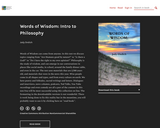
Words of Wisdom can come from anyone. In this text we discuss topics ranging from "Are Humans good by nature?" to "Is there a God?" to "Do I have the right to my own opinion?" Philosophy is the study of wisdom, and can emerge in our conversations in places like social media, in school, around the family dinner table, and even in the car. The text uses materials that are 2,500 years old, and materials that were in the news this year. Wise people come in all shapes and types, and from every culture on earth. We have poetry and folktales, sacred writings and letters. Dialogues and interviews, news columns, podcasts, Ted Talks, You Tube recordings and even comedy are all a part of the content in this text.You will be most successful using this collection this on line.